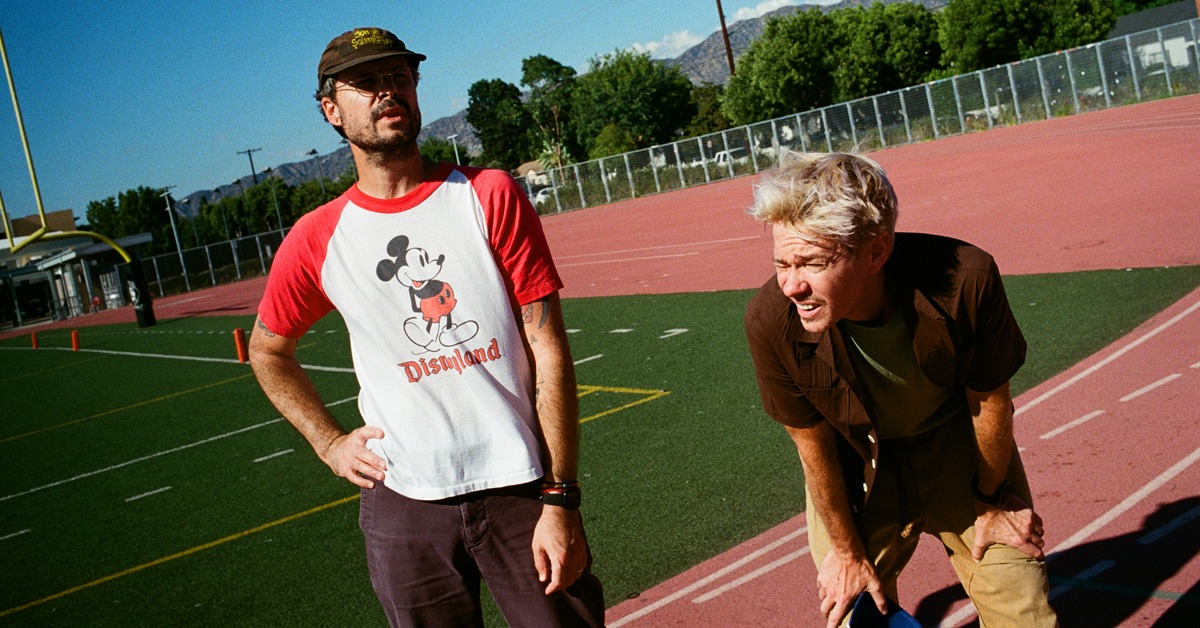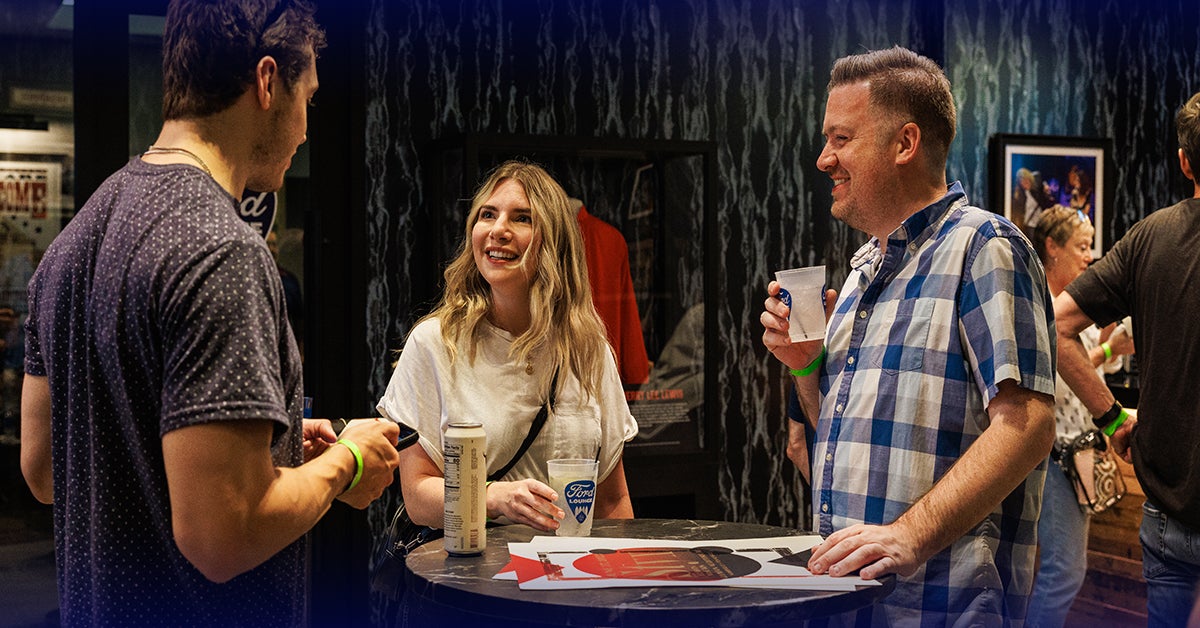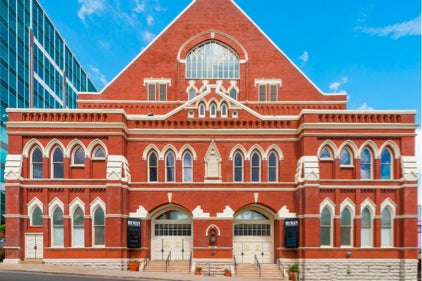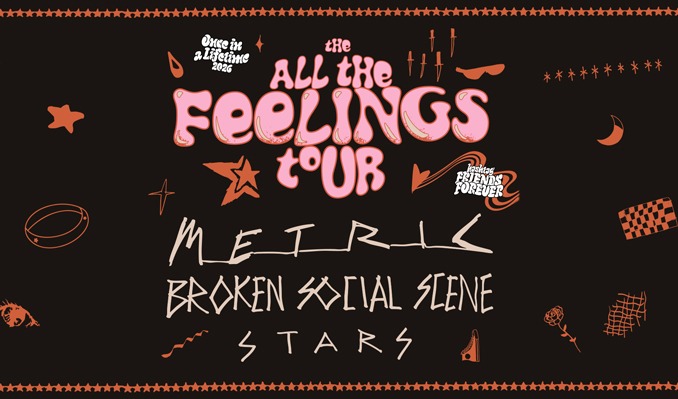-
Date & TimeFriday April 3, 2026 6:50 PM6:50 PM
-
On SaleOn Sale Now

Just as Nate Ruess and Sam Means were finally able to sort through the aftermath of the 2020 pandemic — which first stalled, then completely wiped out their last attempt at a reunion — tragedy struck again. On the very first day of recording new music in nearly 20 years with Grammy-winning producer Brendan O’Brien (Pearl Jam, The Killers, Bruce Springsteen), the Los Angeles wildfires broke out, leaving devastation across the city. It was enough to inspire a little conspiratorial thinking.
“It seriously felt like the universe was against us,” Ruess says, trailing off. “It was at least…” “It was testing us, for sure,” Means adds, finishing the thought.
It’s no wonder that Boycott Heaven, their third album, is charged with *there is no waiting on tomorrow* energy. After all, if the universe was in fact putting you through your paces, how might you respond? Not on some far-off imagined judgment day, but right now?
“Holy roller, don’t go wasting all your time,” Ruess sings in the boisterous single “Holy Roller.” In other words: the time for creating something more like heaven isn’t tomorrow or some other day — it’s today.
A certain romantic fatalism has always coursed through The Format’s lyrics, which the more mature Ruess cops to in the heartland rocker “Shot in the Dark.” “Lived my whole life like I was ready to die,” he confesses over jangling guitars and stomping rhythms. But Boycott Heaven is filled with reflections on reasons to stick around this broken old world: family, lifelong connections, distorted guitar riffs, and a stubborn belief that — even as bad as it is — tomorrow could be better.
Once it was safe to return, the duo got back to work at Henson Recording Studios. Sam and Nate both played electric guitars — Ruess having picked up the instrument in the years since The Format’s last album, in addition to launching a solo career, forming the chart-topping fun. with Jack Antonoff and Andrew Dost, and collaborating with P!nk, Kesha, and Hayley Williams of Paramore. Their rhythm section featured O’Brien on bass and drummer Matt Chamberlain (David Bowie, Bob Dylan, Soundgarden, Fiona Apple).
Fans of Interventions + Lullabies (2003) and Dog Problems (2006) will recognize the hooks and retro-pop bravado, but Boycott Heaven signals a new era. It’s not a nostalgia play, even as it nods to the alt-rock, grunge, and pop-punk sounds Ruess and Means first bonded over as Arizona teenagers.
“We first bonded listening to bands like Weezer, Pearl Jam, Stone Temple Pilots,” Ruess says. “I’m a new guitarist, just enamored with power chords, so I’m listening to all this stuff we’d listen to back then — NOFX, Lagwagon. But you take that pop-punk stuff and slow it down, have Matt Chamberlain play on it, and then it feels a little like grunge. All that’s in there.”
“It does kind of bring us back,” Means adds — not just in terms of time but “as a partnership, too. It feels like a cool extension of where we came from.”
Though the concept of recording with a mega-hit producer was intimidating at first, Means says O’Brien made it easy to focus on the music. “Brendan just being Brendan made it so that we could focus on being there to make a good record and have a good time,” he says. “Not that it wasn’t a whirlwind — cause it was. When it happened, it happened fast.”
With steady hands like O’Brien and Chamberlain backing them up, Ruess and Means didn’t have to second-guess the implications of following up their past work — the act of creating new sounds kept them fully occupied. The results are diverse: from the power-pop charger “Depressed,” with buzzsaw guitars and close harmonies, to the folk ballad “Right Where I Belong,” to the rousing anthem “No You Don’t,” which could be a lost Pinkerton B-side.
Even as they disbanded, The Format never fully closed the door on future collaboration. They steadily resisted the “emo nostalgia” cash-ins offered to them. Ruess focused on new projects; Means on solo music and his independent merchandise company, Hello Merch.
When Ruess contacted him in August 2024, he didn’t realize the band would instantly flip the switch into new Format music mode. But as the two started bouncing ideas back and forth, it became clear: their creative psychic connection hadn’t dulled.
“At first, we weren’t even sure,” Means says. Ruess had sent a set of guitar-based demos — a new approach for the mostly vocal-driven songwriter — and Means initially thought they might be for the follow-up to Ruess’s solo debut Grand Romantic (2015). But as they worked, it became obvious: “Well yeah, this is a Format record,” Ruess says. “What else could it be?”
Though Means admits some people will read the words boycott heaven and jump to conclusions, Ruess says the title came by accident. “It was a hashtag on Twitter — I read ‘boycott heaven,’ but it was ‘boycott Heineken,’” he laughs. “But I just thought the words sounded beautiful together. It’s not an anti-religion record — I think religion can be beautiful — it’s just that when something’s out of balance, sometimes a boycott is in order.”
Ruess cites Paul Schrader’s First Reformed (2017) as a major inspiration: bleak yet beautiful, unafraid to wrestle with faith and despair while keeping empathy intact. “I would love nothing more than to write about the world in a cheesy way,” Ruess says with a wry laugh. But instead, Boycott Heaven portrays the world as it is: beautiful, sad, and — no matter how hard to see — still full of possibility.
Following sold-out reunion gigs in Phoenix, Los Angeles, and New York, where songs from Boycott Heaven debuted live, the new album signifies both a rebirth and a continuation of The Format. When they originally disbanded in 2008, their goodbye note referenced a Twin Peaks DVD box set they were passing back and forth to unravel its mysteries. While cutting Boycott Heaven, Means insisted they watch the 2017 revival, Twin Peaks: The Return.
The mysteries — and the magic — remain.
Like Mark Frost and the late David Lynch returning to their beloved fictional Washington town, Boycott Heaven is the product of two longtime confidants creating something only they could make together: changed by time, but still tied to their roots.
“Been gone for way too long,” Ruess sings on the album closer “Back To Life.” “I never meant to say goodbye,” he follows up. The song marks a new start, a new beginning, and a new chapter in the story of The Format.

ELEVATE YOUR RYMAN EXPERIENCE
Want to make your night at the Ryman an iconic one? Snag a spot in our new and improved Ford Lounge. Hang out in our recently-expanded private space, grab some food and a top-shelf drink from the open bar, and take home a commemorative Hatch Show Print Poster.
Upgrade your ticket, you deserve it!
Note: Must purchase show ticket separately.
Sign Up to Receive Updates and Special Offers From The Ryman And The Opry Entertainment Group
Venue Information

Ryman Auditorium
Ryman Auditorium is one of the most revered stages in modern music. Built in 1892, the historic venue has hosted artists across generations and genres including Dolly Parton, Johnny Cash, Coldplay, Taylor Swift, and many more.







